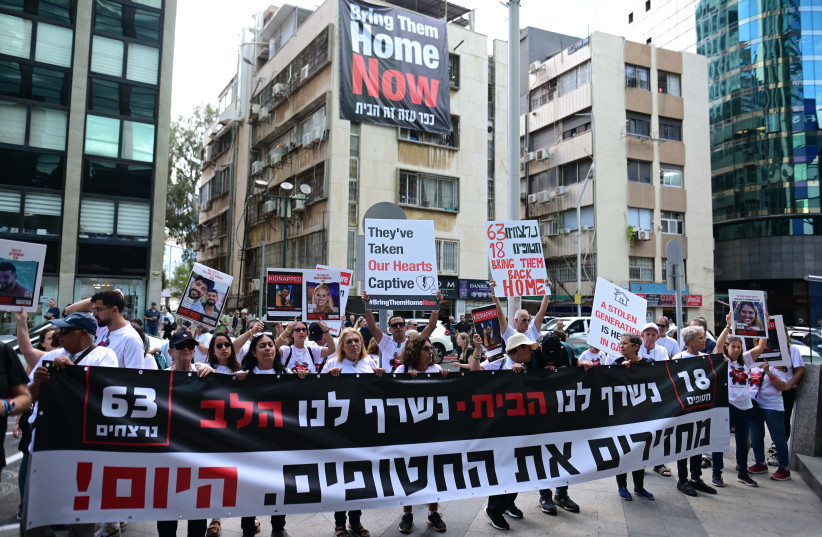One of the released Israeli hostages said on Monday that 'At least three women were sexually assaulted by their Hamas captors.'
"It was an unprecedented situation," Chen Goldstein-Almog, a released hostage, recounted on Monday, after being freed from Hamas captivity, where she was held along with her three children.
"We assumed that Israel would refrain from any military action. That they would first ensure our safe release and then comply with the captors' demands. However, as days passed, we realized the complexity of the situation. The escalation of air force strikes made us fear that we were being sacrificed for greater strategic purposes."
"We heard three firsthand accounts and another story that was relayed to us," she continued, "about incidents that occurred a few weeks after our stay in Gaza. These women were physically harmed. The way they were sexually abused and their bodies violated leaves them unsure of how to cope. If they had been released earlier, they might have been spared from this trauma. We also saw a young man who was beaten."
Regarding the kidnapping, she detailed how she and her children quickly understood that Nadav, the family's father, and their eldest daughter, Yam, had been killed in their home.
"Some of us were turned away, but we all passed him as he lay there, and we never left his side. We realized the gravity of the situation en route. When they took us, I told my children, 'Yam is certainly no longer with us.' And Nadav too, it was a point-blank shot to the chest. It turns out they were left in the house for several days before they could be retrieved." In captivity, "we later found out that it wasn't just one of our guards, but several, who had raided our home."

Family was moved around due to strikes on Gaza
She mentioned that she and her children were never separated: "We were always together. There was more emotional repression during our time there. Our freedom was restricted, meals were infrequent, and at times, we experienced hunger."
"We spent a month and a half in a central apartment with a telephone line," she described their place of captivity, "then there was a sort of loss of control. We felt their helplessness too. The attacks increased to the extent that the buildings we were in suffered damage. This led to a more intensive shuffling of our locations."
Chen testified about being taken aback: "I was amazed by the composure of my children on the day we were captured, and their resilience throughout the ordeal."
What surprised her, she explained, was "the confidence with which they communicated with our captors in Hebrew. They learned many words in Arabic. They wrote and drew extensively. A lot of materials accumulated, and they said they would bring them to us, but they never did."
She recounts a singular instance of intimidation: "There was one threat when something about the way I was moving around, or rather too freely, in the first apartment we were taken to, seemed off to them. There was a looming threat that I might be harmed, but it never materialized. That was the only time I felt threatened in such a manner."
Sharing her thoughts on their release, she says, "It took two to three days after we were told 'today you are on the list' for our release to actually happen. The girls with us rejoiced for us, and we were overjoyed too, but it was a cautious happiness. Until we truly left, we didn’t allow ourselves to be too happy, to avoid disappointment. We endured many disappointments throughout our captivity."
Reflecting on the aftermath, she says, "I am still processing everything. I'm here in the present, overwhelmed with thoughts about what we went through and those who remain behind," she states, "We're trying to rebuild something new from the ruins of our lives, but our minds are still with the girls who are left there. Two weeks have gone by, and they are still there."
Sharing more, she says, "The girls who were with us entrusted us with numerous messages for their families. I’m certain they are struggling with the difficult emotions of still being left behind. We hoped that the girls who remained would be released a day or two after us. Hanukkah came, and they are still not here, which is disheartening, frustrating, and infuriating."
On the subject of the remaining captives, she asserts, "Everything possible must be done to rescue them. The women, the injured women, the female soldiers, the civilian boys, the soldiers, the adults. All of them must be brought out. They must not be broken by this ordeal. They face daily dangers and are in dire need of both medical and psychological care."
